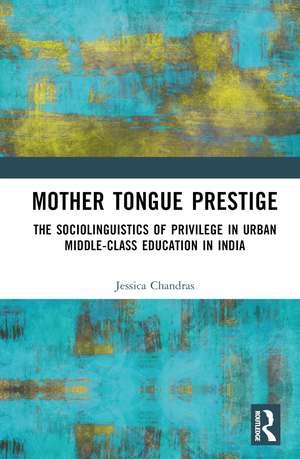Mother Tongue Prestige: The Sociolinguistics of Privilege in Urban Middle-Class Education in India
Autor Jessica Sujata Chandrasen Limba Engleză Hardback – sep 2023
Mother Tongue Prestige parses out threads of motivation, perceptions of education, and aspirations tied to language use and learning that shape generations of students in an educational system preparing them for a globalized workforce and urban, multilingual livelihoods in India and abroad. It will be an indispensable resource for students and researchers of education, language, sociology, sociology of education, linguistics, sociolinguistics, and South Asian studies.
| Toate formatele și edițiile | Preț | Express |
|---|---|---|
| Paperback (1) | 379.18 lei 43-57 zile | |
| Taylor & Francis Ltd. – 18 dec 2024 | 379.18 lei 43-57 zile | |
| Hardback (1) | 994.62 lei 43-57 zile | |
| Taylor & Francis – sep 2023 | 994.62 lei 43-57 zile |
Preț: 994.62 lei
Preț vechi: 1212.95 lei
-18% Nou
Puncte Express: 1492
Preț estimativ în valută:
190.49€ • 196.26$ • 159.57£
190.49€ • 196.26$ • 159.57£
Carte tipărită la comandă
Livrare economică 24 februarie-10 martie
Preluare comenzi: 021 569.72.76
Specificații
ISBN-13: 9781032404554
ISBN-10: 1032404558
Pagini: 186
Ilustrații: 4 Halftones, black and white; 4 Illustrations, black and white
Dimensiuni: 156 x 234 x 13 mm
Greutate: 0.5 kg
Ediția:1
Editura: Taylor & Francis
Colecția Routledge India
Locul publicării:Oxford, United Kingdom
ISBN-10: 1032404558
Pagini: 186
Ilustrații: 4 Halftones, black and white; 4 Illustrations, black and white
Dimensiuni: 156 x 234 x 13 mm
Greutate: 0.5 kg
Ediția:1
Editura: Taylor & Francis
Colecția Routledge India
Locul publicării:Oxford, United Kingdom
Public țintă
Postgraduate and Undergraduate CoreCuprins
Acknowledgments viii
PART I
The Nouns: The Political Economy of Language in Education 1
1 Introduction: Linguistic Privilege and Education in Urban India 3
2 Speaking Marathi Like a Punekar: Caste, Class, and Linguistic Capital in Pune 30
3 Linguistic Identities in the Indian University: Language Ideologies and Student Identities 57
PART II
The Verbs: Socializing Language Ideologies in Classroom Discourse 83
4 Disciplining Language: Linguistic Socialization in Primary School Classrooms 85
5 Translanguaging Classrooms: Hypothetical Reported Speech in Classroom Discourse 112
6 Priming English: Learning English through Mother Tongues 133
7 Conclusion 159
Index 173
PART I
The Nouns: The Political Economy of Language in Education 1
1 Introduction: Linguistic Privilege and Education in Urban India 3
2 Speaking Marathi Like a Punekar: Caste, Class, and Linguistic Capital in Pune 30
3 Linguistic Identities in the Indian University: Language Ideologies and Student Identities 57
PART II
The Verbs: Socializing Language Ideologies in Classroom Discourse 83
4 Disciplining Language: Linguistic Socialization in Primary School Classrooms 85
5 Translanguaging Classrooms: Hypothetical Reported Speech in Classroom Discourse 112
6 Priming English: Learning English through Mother Tongues 133
7 Conclusion 159
Index 173
Notă biografică
Jessica Sujata Chandras is a linguistic anthropologist trained in qualitative, ethnographic, and sociolinguistic research methods. Currently, she holds an Assistant Professor position in the Department of Sociology, Anthropology, and Social Work at the University of North Florida. Her PhD is in Anthropology from the George Washington University, in Washington, DC, and was awarded in 2019. Her ongoing research in India examines values attached to language and practices of multilingual language socialization pertaining to education through a lens of power. She explores a political economy of language with a focus on intersections of language and socioeconomic class, caste, and politics of language revitalization movements. In her projects, she examines configurations of identity categories, such as caste and class, with language negotiations in access to education. Previously, she has also worked and researched in multilingual communities on impacts of indigenous language on identity and community formation in Oaxaca, Mexico, and the Basque Country.
Descriere
This book studies the intersection of language and social privilege in education in India. The author examines how and why education at the pre-primary, secondary, and higher education levels in India remains largely segregated by socioeconomic class and caste through the lens of language.
